Musk’s Lawsuit Claims Apple’s Deal with OpenAI Harms Competition
In a striking legal battle, X (formerly Twitter) has filed a lawsuit against Apple, accusing the tech giant of engaging in anticompetitive practices that restrict competition in the rapidly evolving field of artificial intelligence. The lawsuit centers on what X describes as an exclusive arrangement between Apple and OpenAI, the developer behind ChatGPT, which X alleges unfairly disadvantages rival AI technologies, particularly its own product, Grok.
Allegations of Exclusivity and Harm
According to X’s legal complaint, Apple’s exclusive partnership with OpenAI has caused significant harm to other AI developers by denying them crucial access to the features that enhance their technologies. X contends that this exclusivity prevents rivals from effectively competing, stating, “There is no telling how long this exclusive arrangement will last,” and arguing that Apple lacks a valid pro-competitive rationale for prioritizing ChatGPT over other AI tools.
The complaint alleges that Apple has consistently rejected requests for Grok to be featured on the App Store, despite its launch and subsequent updates, such as the introduction of Grok’s "Imagine" feature. X claims these decisions not only manipulate the visibility of competing apps but also play a role in restricting the market use of Grok and similar chatbot technologies.
Accusations of Manipulation and Delay
The lawsuit extends beyond claims of exclusivity. X accuses Apple of “manipulating App Store rankings” and deliberately delaying updates for the Grok app to diminish competition further. Musk’s team argues that if Apple had not engaged in such anticompetitive behaviors, Grok and other rival systems would have gained more market traction, potentially leading to enhanced revenue and accelerating innovation within the chatbot landscape.
Concerns Over AI Innovation
Musk’s concerns also touch on the larger implications for AI innovation due to the alleged Apple/OpenAI collaboration. X suggests that the terms of this collaboration appear designed to stifle progress, noting that OpenAI has reportedly offered ChatGPT to Apple without immediate financial compensation. X argues that Apple essentially values OpenAI’s technology as a strategic advantage over financial gains at this stage.
A central claim of the lawsuit asserts that Apple seeks to leverage OpenAI’s technology, not for short-term profit, but to eventually secure a portion of the monetization that will arise through their devices. This potential synergy is characterized by X as an effort to maintain dominance in a market where innovation is critical.
Big Tech’s Growing Influence in AI
As this case unfolds, it highlights broader concerns regarding the power that large tech companies wield over emerging technologies. The implications of Apple’s relationship with OpenAI could reshape the competitive landscape for AI solutions and innovation.
By potentially limiting access to tools and platforms, major players not only solidify their own market positions but also restrict the growth opportunities for startups and smaller companies in the sector. Such behaviors raise significant questions about accountability and fairness in a space that thrives on innovation and diversity.
Conclusion: The Future of Competitive AI Development
In summary, Musk’s lawsuit against Apple underscores significant tensions in the realm of AI development, where exclusivity agreements and app store regulations can profoundly impact innovation. As this case progresses, its outcomes could set important precedents for how tech companies interact with and support emerging technologies.
The stakes are high, not only for X and its Grok application but also for the broader landscape of AI. Should X’s allegations be substantiated, the case could prompt a reevaluation of existing practices in the industry, encouraging a more equitable environment that fosters innovation rather than stifles it. As competition intensifies, the future of AI could hinge on the outcomes of these critical legal battles in the tech world.









